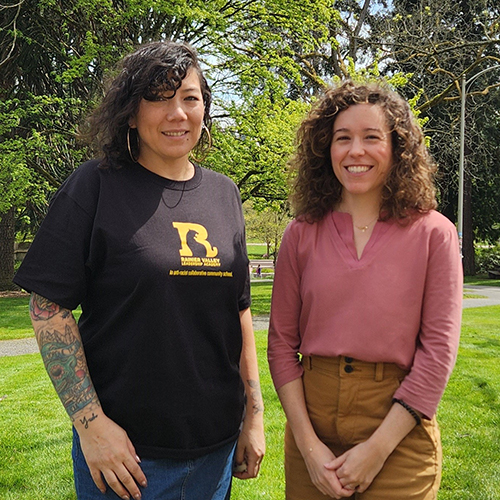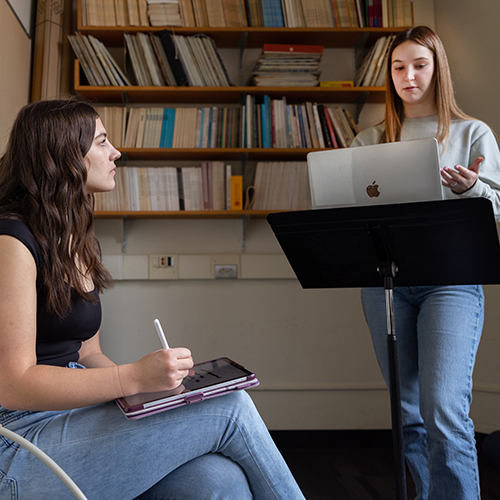Many media outlets have been ramping up coverage on issues like immigration, race, and equity. Not The Seattle Globalist. The Globalist, a web publication founded at the University of Washington, has always put those issues front and center.
“It feels like what we’ve been reporting on all along is what everyone is talking about now,” says Sarah Stuteville, Globalist co-founder and education director. “We’re really well positioned to cover those issues from a lot of diverse angles and perspectives.”

Stuteville and two fellow journalists, Jessica Partnow and Alex Stonehill, launched The Seattle Globalist in 2012 after joining the UW Department of Communication as artists in residence. They were hired to teach courses on entrepreneurial journalism and were provided office space and a research grant to use toward an entrepreneurial project. All three share a background in international journalism, so they decided to create an online publication that focuses on Seattle’s global connections.
The original plan was to have trained journalists write all the stories. But the founders rethought that approach when Seattle’s diverse international communities expressed a desire to be more involved in coverage of their communities. The Seattle Globalist began offering media workshops within communities so that anyone could pitch or write a story for the publication. The Globalist also launched an apprenticeship program for young journalists (ages 17 to 23) within communities, pairing them with Globalist editors/mentors. Numerous UW students write for the publication as well, particularly those enrolled in a multiplatform journalism course offered by the Department of Communication each quarter.

“We changed our mission to elevating diverse voices through media, and started considering ourselves an organization that was half publication and half media education,” says Stuteville. “It wasn’t going to be just trained journalists going into those communities to tell the stories, but also people coming out of those communities writing stories themselves. And what we found is that our coverage got so much better, because our journalists were more embedded and accountable to communities and had more direct access to the issues they were reporting on. It allowed us to have content and perspectives that very few other publications have.” Stuteville notes that The Seattle Globalist’s contributors are 67% people of color, 73% female, and 45% immigrants or children of immigrants, while the average U.S. newsroom is 83% white and two-thirds male.
It feels like what we’ve been reporting on all along is what everyone is talking about now.
After adopting its new approach, The Seattle Globalist began gaining recognition. Recent awards include a Courage in Journalism Award from the Council on American-Islamic Relations, a Gracie Award from the Alliance for Women in Media, a Society of Professional Journalists (SPJ) Innovation Award for The Seattle Globalist’s media workshop series, and a regional first place award from SPJ for general excellence in the small daily print and online category.
The publication’s most popular stories? First-person accounts that shed light on how contemporary political and social issues impact individuals or communities. “There’s a way to do those stories that is informative and engaging and encourages conversation,” says Stuteville. “We’ll ask the reporter to go even further than their own experience, dig deeper, to place that experience in some context. That’s when they really hit a home run. Our audience really responds to those pieces.”

With all the community involvement and journalism awards, The Seattle Globalist seems to have hit its stride. There’s just one glitch: funding. The Department of Communication, faced with a tightening budget, will discontinue its funding of The Seattle Globalist after the current academic year. The publication’s staff has been seeking other funding sources—$5K per month in subscriber donations will help in the short-term—but the future of the publication is unclear.
“We were never under the impression that the relationship with the Department of Communication would last forever,” Stuteville says. “We knew it was intended to provide an incubation period for The Seattle Globalist. We had hoped that it would last for a few more years, and initially the idea was that it would, but budget cuts changed that. It’s disappointing, but honestly we were so lucky to have the opportunity to incubate this at the UW, to have people in the department who believed in the idea. It was a really good arrangement for getting us off the ground and helping us figure out who we are.”

The fate of The Seattle Globalist will impact many in the department, since undergraduate and graduate students hone their reporting and writing skills as contributors, often with the guidance of Globalist editors. Globalist staff also present talks and workshops in classes beyond those they personally teach. “My hope is that no matter what happens next, there will be ways for us to continue to have a connection with the University of Washington,” says Stuteville. “The relationship has been so symbiotic for so long that I think we’ll be able to make that happen somehow.”
But first The Seattle Globalist needs to secure a stable funding source so that it can continue to share much-needed stories. “It’s become so evident in the past year, especially in the last few months, how important this kind of media is — how important all media is,” says Stuteville. “We can’t risk losing any of it. In fact we need much more of it.”
. . .
Visit The Seattle Globalist at seattleglobalist.com, and learn how you can support the publication.
More Stories

Learning Through Storytelling
Through a UW-led storytelling workshop and course, English language learners in the Seattle area strengthened their language skills and built community.

What the Sky Teaches Us
Brittany Kamai, an astrophysicist with knowledge of Pacific Islanders' Indigenous navigation using the sky, is teaching a new UW course, Pacific Indigenous Astrophysics.

The Truth About Public Speaking
Becoming an effective public speaker requires planning and practice. Professor Matt McGarrity and consultants at the UW Center for Speech & Debate are available to help.